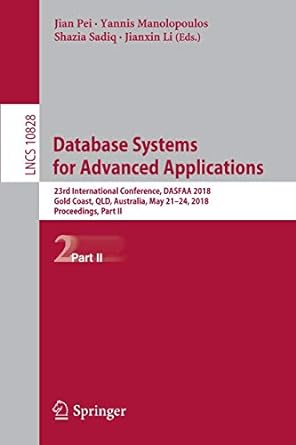Question
Memory-Mapped Files Programming language: c (under Linu) Modify the mmap-write and mmap-read programs such that the former write n ran- dom integers to the file
Memory-Mapped Files Programming language: c (under Linu)
Modify the mmap-write and mmap-read programs such that the former write n ran- dom integers to the file and the latter reads and prints all integers. n is an argument to both programs. It must be greater than zero. Include error handling when parsing the argument n and for the system calls open() and mmap().
Example executions: $ make $ ./mmap-write /tmp/afile 10 $ cat /tmp/afile -68 7 24 -10 48 24 -50 -97 52 -60 ./mmap-read /tmp/afile 10 -68 7 24 -10 48 24 -50 -97 52 -60 $ ./mmap-write /tmp/afile 0 invalid number of integers $ ./mmap-write /tmp/afile x failed to parse number of integers ./mmap-read /tmp/invalidfile 10 open error: No such file or directory
--------------------------------------------------
mmap-write.c
/* Mapped-memory example - Writer program */ #include #include #include #include #include #include #include #include "mmap.h"
/* return a uniformly generated random number in the range [low,high] */ int random_range (unsigned const low, unsigned const high) { unsigned const range = high - low + 1; return low + (int) (((double) range) * rand () / (RAND_MAX + 1.0)); }
/* Create and write to a shared file for communication with another process. * * argv[1] = file name * * Note: Error processing is omitted */ int main (int argc, char* const argv[]) { int fd; void* file_memory;
/* seed the random number generator */ srand (time (NULL));
/* open or create a file to hold an unsigned integer */ fd = open (argv[1], O_RDWR | O_CREAT, S_IRUSR | S_IWUSR);
/* write FILESIZE spaces */ for (int i=0; i write (fd, "", 1); /* write a NULL at EOF */
/* create the memory-mapping 1st param=start addr of mapping into memory, NULL means chosen by OS 2nd param=length of map (bytes) 3rd param=protection 4th param=options, MAP_SHARED used for interprocess communications 5th param=file descriptor of mapped file 6th param=offset from start of file where mapping starts */ file_memory = mmap (NULL, FILESIZE, PROT_WRITE, MAP_SHARED, fd, 0); close (fd);
/* write a random integer to memory-mapped area */ sprintf((char*) file_memory, "%d ", random_range (-100, 100));
/* release the memory */ munmap (file_memory, FILESIZE); }
--------------------------------------------------------------------
mmap-read.c
/* Mapped-memory example - Reader program */
#include #include #include #include #include #include #include "mmap.h"
int main (int argc, char* const argv[]) { int fd; void* file_memory; int integer;
/* open the file */ fd = open (argv[1], O_RDWR, S_IRUSR | S_IWUSR);
/* create the memory-mapping */ file_memory = mmap (NULL, FILESIZE, PROT_READ | PROT_WRITE, MAP_SHARED, fd, 0); close (fd);
/* read and print the integer */ sscanf (file_memory, "%d", &integer); printf ("file contains: %d ", integer);
/* release the memory */ munmap (file_memory, FILESIZE);
return 0; }
--------------------------------------------------------------------
mmap.h
/*(It has this line of code only)*/
#define FILESIZE 256
--------------------------------------------------------------------
Makefile
all: mmap-read.o mmap-write.o gcc -o mmap-read mmap-read.o gcc -o mmap-write mmap-write.o
mmap-read.o: mmap-read.c gcc -c mmap-read.c
mmap-write.o: mmap-write.c gcc -c mmap-write.c
clean: rm -f *.o mmap-read mmap-write *~
Step by Step Solution
There are 3 Steps involved in it
Step: 1

Get Instant Access to Expert-Tailored Solutions
See step-by-step solutions with expert insights and AI powered tools for academic success
Step: 2

Step: 3

Ace Your Homework with AI
Get the answers you need in no time with our AI-driven, step-by-step assistance
Get Started


